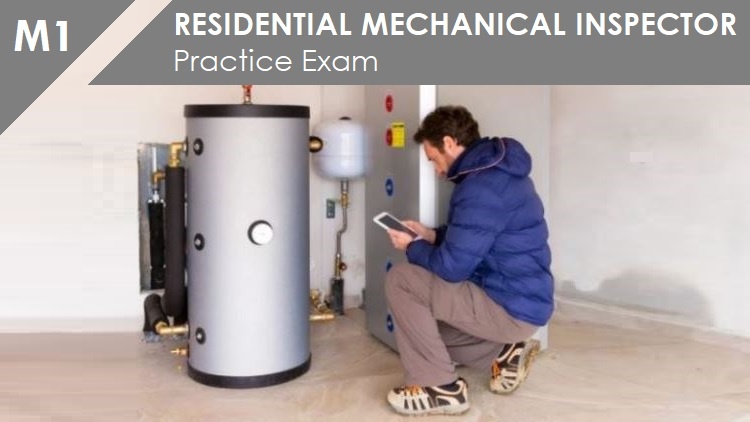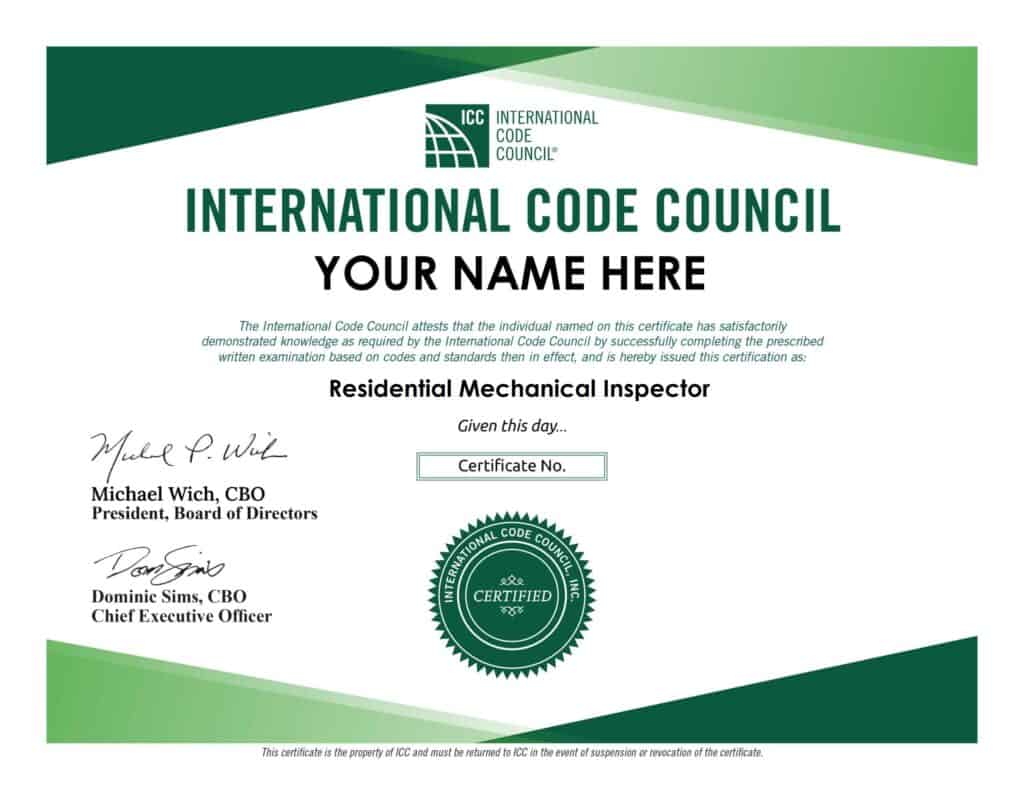
Includes 2 Practice Exams
60 Questions Each
Want to become a Certified Residential Mechanical Inspector?
The M1 Residential Mechanical Inspector Certification Exam administered by the International Code Council (ICC) tests an individuals knowledge of the International Residential Code® (IRC®).
Your first step is to know a little bit about the exam itself and what areas you should be studying for.
As a Certified Residential Mechanical Inspector you are responsible for performing inspections of the installation, maintenance, alteration of mechanical systems for one-and-two family dwellings not more than three stories.
The residential mechanical inspector is also responsible for verifying the installation of fuel gas distribution piping and equipment, fuel-gas-fired appliances and fuel-gas-fired appliance wiring.
The Residential Mechanical Inspector is capable of locating specific sections in the International Residential Code in order to interpret regulations and provide accurate information to applicants, contractors, property owners, and colleagues.
M1 Residential Mechanical Inspector Exam Specifications
The exam consists of 60 multiple-choice questions. You have a time limit of 2 hours to complete the exam and it is open book meaning you can only use the code books referenced by ICC. For this exam it is the International Residential Code® (IRC®).
The code edition of the reference used should reflect the code edition of the exam you are taking. For example if you plan to take the 2021 version of the exam, you should use the 2021 International Residential Code. No work experience is required to take the exam and you must be at least 18 years of age.
The International Code Council (ICC) requires you to take the exam through the PRONTO system.
PRONTO is a new way of taking your testing exam from the comfort of your home or office. PRONTO stands for Proctored Remote Online Testing Option. For more information about the PRONTO online testing option, click here.
What does the M1 Residential Mechanical Inspector exam cover?
This exam covers 7 main areas such as:
- General Administration
- Heating/Cooling/Water Heaters
- Exhaust and Ventilation Systems
- Duct Systems
- Combustion Air
- Chimneys and Vents
- Fuel Supply Systems
The following exam content outline can act as a study guide to help you study for the exam and to gain a better understanding of what the 7 main areas of the exam will cover.
General Administration | 10% |
Project Administration Verify that project information, including approved plans and specifications, is provided and is adequate. Verify that required permits are issued and valid. Verify that products not detailed in the code are approved by the building official and installed according to their listing. | 2% |
Public Information and Legal Provide general information on code provisions. | 3% |
Manufacturer's Installation Instructions Verify the manufacturer’s installation instructions and the listing of the equipment have been followed during the installation of the equipment. | 5% |
Heating/Cooling/Water Heaters | 24% |
Heating Equipment Verify that the installations of mechanical equipment and appliances comply with code requirements, the manufacturer's instructions, and listing of the equipment and have proper access, clearances, supply air, return air, and connection to ducts and plenums. | 10% |
Water Heaters and Boilers Verify that the installations of water heaters and boilers comply with code requirements, the manufacturer's instructions, and listing of the equipment and have proper access and clearances. | 5% |
Cooling and Refrigeration Verify that the installation of cooling systems and cooling units complies with code requirements, the manufacturer's instructions, and listing of the equipment and have proper access and clearances, supply air, return air, and connection to ducts and plenums. | 5% |
Other Systems Verify that special systems utilizing fuel-burning equipment such as interior open-flame grills, pool and sauna heaters, hydronic heating systems, and decorative appliances comply with code requirements, the manufacturer’s instructions, and listing of the equipment and have proper access and clearances. | 2% |
Heat Pumps and Solar Thermal Energy Verify that hydronic heating, including ground source heat pump systems an solar thermal energy systems comply with code requirements, the manufacturer's instructions, and listing of the equipment and have proper access and clearances. | 3% |
Exhaust and Ventilation Systems | 8% |
Exhausts, Fans, and Kitchen Range Hoods Verify that the installation of exhaust fans and range hoods complies with code requirements. Verify that proper mechanical ventilation is provided where required. | 3% |
Clothes Dryer Exhaust Verify that the installation of clothes dryer exhaust ducts complies with code requirements. | 5% |
Duct Systems | 8% |
Duct Construction and Installation Verify that ducts are constructed of acceptable materials and that installation methods, including support and insulation, comply with code. | 3% |
Duct and Plenum Use and Application Verify the correct use and application of ducts and plenums with the mechanical system installed. Verify sizing of the supply and return air ducts. | 5% |
Combustion Air | 16% |
Combustion Air Verify proper sources of air supply for fuel burning appliances and size and location of openings. Verify that materials and installation of combustion air ducts comply with code. | 16% |
Chimneys and Vents | 19% |
Venting of Fuel-Burning Appliances Verify size, type, location, clearances, connections, and terminations of vents and venting systems. | 7% |
Chimney and Vent Connectors Verify size, type, location, and clearances of chimney and vent connectors for compliance with code. | 7% |
Factory-Built Chimneys and Fireplaces Verify clearances, bracing, listing, and labeling of the installation of factory-built chimneys and connectors. | 3% |
Masonry Chimneys and Fireplaces Verify proper construction of fireplace and chimney components. | 2% |
Fuel Supply Systems | 15% |
Fuel Supply Installation and Sizing Verify that gas piping systems are installed with proper materials and supports and are sized properly. Verify that fuel gas piping is tested for tightness. | 8% |
Fuel System Connections Verify that fittings, valves, connections, and transition of materials are in compliance with code. | 5% |
Oil Piping and Storage Verify that the oil piping and storage are installed with proper materials and supports and are sized properly. Verify that fuel supply system is properly sized. | 2% |
What do you get when you pass the M1 Residential Mechanical Inspector exam?
Certification
Bragging rights! Well actually you will receive a pass letter the same day right after your exam. You will have a certification number assigned to you so that if someone were to search for a certified professional within the ICC website, your name will come up!
In addition to being a Certified Residential Mechanical Inspector (Yayyy!) you will receive a wall certification that looks like this…

Need Practice?
Why not try our M1 Residential Mechanical Inspector Practice Exam?
Want to test your knowledge of how well you know the code? Or maybe just get a feel for the exam?
Try out our Practice Exam for the M1 Residential Mechanical Inspector Certification Exam!
This practice exam is designed for those who are looking to take the 2021 or 2018 version of the M1 Residential Mechanical Inspector Certification Exam through the International Code Council (ICC). These practice exams are intended to help you prepare for the actual exam by helping you navigate through the code book to familiarize yourself with the specific code sections. They will test your knowledge on the exam content areas covered to improve your chances of passing the certification exam.
This is a great way to prepare yourself for the actual exam administered by ICC. Every building code professional knows that the key to passing the ICC exams is to do practice problems. Don’t just take the exam purely on experience alone. Let this resource get you focused on realistic problems built around the exam content being covered.

Includes 2 Practice Exams
60 Questions Each
Happy Test Taking!
Related Articles to Read:
